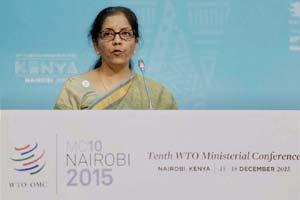India on Saturday expressed “disappointment” over the lack of a unanimity in re-affirming to conclude the 2001 Doha Development Agenda at the Nairobi ministerial of the World Trade Organisation (WTO), although it managed to secure commitments to allow developing nations to use a special safeguard mechanism (SSM) to protect their farmers from a spurt in imports and for a work plan on a permanent solution to the issue of food security.
However, developed nations refrained from making any commitment to trim massive trade-distorting farm subsidies offered by them, despite hectic negotiations that exceeded the scheduled closing of the ministerial by almost a day from December 18.
According to a commerce ministry statement here, while the majority–consisting of the G-33, including India, least-developed countries and the African group–wanted a reaffirmation of the Doha round mandate, a few members opposed it. “This marks a significant departure from the fundamental WTO principle of consensus-based decision making,” the statement said.
However, despite the difficulty in negotiations, the draft Declaration “reflects India’s demand for a reaffirmation from all members to work towards a permanent solution on public stockholding (PSH)”, according to the statement. The draft also provides a “ministerial affirmation” that till such time a permanent solution is found, the current peace clause shall continue to be in place.
A peace clause means no WTO member can drag India to the dispute panel for offering more product-specific support to farmers through procurement of grains than stipulated under the WTO until a permanent solution is found.
The declaration also reflects India’s demand for a ministerial decision to develop an SSM for agricultural products, in step with the special safeguard mechanisms enjoyed by the developed nations, that will be available to developing countries.
Commerce and industry minister Nirmala Sitharaman tweeted: “Wish to say that SSM was not even on the cards when we arrived at Nairobi. India got it in & ensured a decision for a work plan too notwithstanding a lack of consensus, even as the language was getting developed on the ‘factual’ narrative paras on the DDA, India ensured that on PSH & SSM the relevant decisions of Bali, GC, & ref to DDA were brought in as the necessary & reassuring links.” “That all unfinished pillars of DDA shall be carried forward was also ensured.The special & differential treatment shall also be carried on,” she said in the tweets.
India, along with other developing countries known as the G33, has been vociferously seeking an SSM to protect farmers against a sudden spurt in dumping, especially from developed nations, including the US and the EU, that offer massive trade-distorting subsidies to farmers.
Analysts said the US and the EU provide massive farm subsidies, in the range of 57-215% of the value of production of several key commodities.
The declaration at Nairobi, which also marked the 20th anniversary of the WTO, reflected the importance of multilateral rules-based trading system and reaffirmed the pre-eminence of the WTO as the global forum for trade rules setting and governance, in an apparent hint of supremacy of the negotiations at the WTO vis-à-vis agreements like the Trans-Pacific Partnership (TPP). The yet-to-be-implemented TPP between the US and 11 other Asia-Pacific nations represents roughly 40% of global gross domestic product and one-third of world trade.
